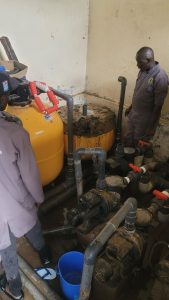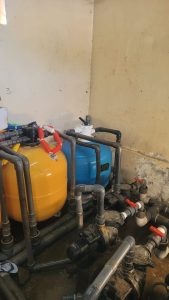Training, Specialty Cleaning, and Production Outsourcing
At Taso, we provide cleaning you can see and feel, in this pursuit, we are committed to ensuring our customers achieve operational excellence in matters of cleanliness, food safety, and hygiene. To both our existing and new customers the below services apply:
We provide training sessions on how and where to use our products to achieve the best results. Every year we select a few of our customers and visit their premises to get feedback and provide training refreshers.
1. Product Knowledge Training: Employees and our customers receive comprehensive training on the company’s detergent products, including their features, benefits, ingredients, and usage instructions. This ensures that employees have a deep understanding of the products they are manufacturing or selling and can effectively communicate this information to customers.
2. Safety Training: Safety training is essential to prevent accidents, injuries, and hazardous incidents in the manufacturing facility. Employees receive training on proper handling of chemicals, use of personal protective equipment (PPE), emergency procedures, and compliance with safety regulations and protocols.
3. Quality Control Training: Employees and our customers learn about quality control standards and procedures to ensure that detergent products meet or exceed regulatory requirements and customer expectations. This includes training on product testing, inspection, sampling, and documentation to maintain consistent product quality.
4. Environmental Compliance Training: Employees receive training on environmental regulations and compliance requirements related to manufacturing operations, waste management, pollution prevention, and sustainability initiatives. This includes training on proper disposal of chemicals, recycling practices, energy conservation, and environmental stewardship.
5. Continuous Improvement Training: Training programs focused on continuous improvement methodologies such as Lean Manufacturing, Six Sigma, or Kaizen are provided to empower employees to identify inefficiencies, streamline processes, reduce waste, and drive continuous improvement in manufacturing operations.
We offer commercial and domestic cleaning services with our products. Some of these include post-construction cleaning, office & Building cleaning, Factory & Warehouse general cleaning.
We also offer services of polish application and stripper application.
Contract manufacturing offers several benefits for businesses looking to outsource their production processes. Here are some of the key advantages:
1. Cost Savings: Contract manufacturing can often result in significant cost savings for businesses. By outsourcing production to specialized manufacturers with lower labor costs, economies of scale, and efficient operations, businesses can reduce manufacturing expenses and achieve better cost control.
2. Focus on Core Competencies: Outsourcing manufacturing allows businesses to focus their resources, time, and attention on core activities such as product development, marketing, and sales. By delegating production to external partners, businesses can streamline operations and concentrate on activities that drive growth and profitability.
3. Access to Expertise and Technology: Contract manufacturers often possess specialized expertise, skills, and technologies that may not be available in-house. By partnering with experienced manufacturers, businesses can access advanced manufacturing capabilities, specialized equipment, and industry knowledge to enhance product quality and innovation.
4. Scalability and Flexibility: Contract manufacturing provides businesses with flexibility and scalability to meet changing demand and market conditions. External manufacturers can quickly ramp up or down production capacity in response to fluctuations in demand, seasonal variations, or new product launches, allowing businesses to adapt more effectively to market dynamics.
5. Speed to Market: Contract manufacturing can accelerate time-to-market for new products by leveraging the expertise, resources, and infrastructure of external partners. Manufacturers with established production capabilities and supply chains can expedite product development and production processes, helping businesses gain a competitive edge and capitalize on market opportunities more quickly.
6. Risk Mitigation: Contract manufacturing helps mitigate risks associated with capital investment, equipment maintenance, and operational uncertainties. By transferring production responsibilities to external partners, businesses can reduce exposure to market fluctuations, production disruptions, and unforeseen challenges, thereby enhancing risk management and business continuity.
7. Global Reach and Market Expansion: Contract manufacturing enables businesses to access global markets and expand their geographic reach more easily. By partnering with manufacturers located in different regions or countries, businesses can leverage international sourcing opportunities, enter new markets, and serve diverse customer segments effectively.
8. Quality Assurance and Compliance: Reputable contract manufacturers adhere to stringent quality standards, regulatory requirements, and industry certifications to ensure product quality, safety, and compliance. By outsourcing production to certified manufacturers with robust quality control processes, businesses can enhance product reliability, consistency, and compliance with regulatory standards.
A clean space goes beyond appearance. It supports health, productivity, and peace of mind. At Solucom Enterprises Limited, we provide professional cleaning and fumigation services designed to deliver visible results you can feel every day. Whether it is your home, office, factory, or vehicle, our trained team ensures every area is cleaned thoroughly and safely.
To begin with, our services are carefully designed to meet different cleaning needs across homes and businesses. We combine professional skills with quality products to achieve consistent and reliable results.
Our Cleaning and Fumigation Services Include
• Office and factory cleaning
• Home general cleaning
• Sofas and mattress cleaning
• Window cleaning
• Curtain cleaning
• Car interior deep cleaning
• Fumigation and pest control
In addition, we support our services with high quality cleaning detergents, accessories, and equipment. This makes it easier for clients to maintain cleanliness long after the service is completed.
Above all, our goal is to provide cleaning you can see and feel. With a strong focus on professionalism, safety, and customer satisfaction, Solucom Enterprises Limited remains a trusted partner for clean and healthy spaces.
Contact us today and let us take care of your cleaning and fumigation needs with confidence and care.
A swimming pool should be a place of comfort and relaxation, not constant worry. However, without proper care and expert support, pool systems can easily develop problems that affect water quality, safety, and running costs. That is why our pool technical services are designed to give you peace of mind while keeping your pool in excellent condition all year round.
Expert Pool Design and Building
Every great pool starts with the right design. We help you plan and build a pool that fits your space, purpose, and budget. Just like building a house needs a strong foundation, a well designed pool ensures durability, comfort, and easy maintenance for many years.
Reliable Periodic Pool Service
Regular servicing keeps your pool systems healthy and efficient. In the same way a car needs routine servicing to run smoothly, periodic pool service helps detect small issues early and prevents expensive repairs later. As a result, your pool stays ready for use whenever you need it.
Professional Pool Cleaning
Clean water is essential for a safe swimming experience. Our pool cleaning service removes dirt, algae, and debris that can affect water clarity and hygiene. Therefore, swimmers enjoy fresh, clear water while pool surfaces remain protected from damage.
Pump, MPV, and Capacitor Reworks
When pool equipment starts underperforming, replacement is not always necessary. We repair and restore pumps, MPVs, and capacitors to proper working condition. Consequently, you save money while extending the life of your pool equipment.
Plumbing and Electrical Reworks
Efficient plumbing and safe electrical systems are the backbone of any pool. Our reworks ensure smooth water circulation and reliable power supply. Because safety matters, this service helps prevent leaks, electrical faults, and system breakdowns.
Installation and Change of Filter Media
Filter media plays a key role in keeping pool water clean. Over time, media wears out and becomes less effective. By installing or changing filter media, we improve filtration, reduce chemical use, and maintain crystal clear water.




Call to Action
Get professional pool technical services that protect your investment and enhance your swimming experience. Contact us today and let our experts take care of your pool while you enjoy the comfort it brings.

 No products in the cart.
No products in the cart.